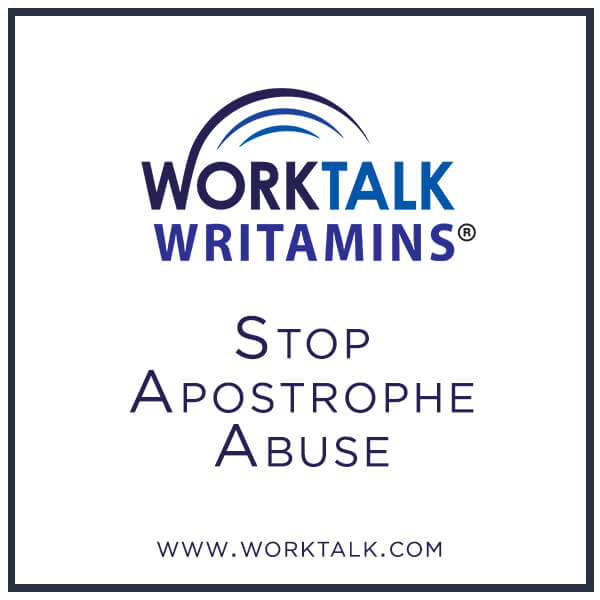
What is it with people and apostrophes? Unsure of where the apostrophes are supposed to go, writers sprinkle them like confetti throughout their writing, leaving readers to clear up the wreckage. Let’s get clear about what apostrophes do and do not do. Then read on for the scandalous new policy regarding the usage of s’.
What apostrophes do
1.Show a contraction (omitted letter or number):
- It’s*, they’re, don’t . . .
- He came of age in the ‘80s.
2.Form the possessive case of a noun:
- John’s book, William and Mary’s reign
- SCE’s proposed rate increases
- Possessive plural: One cat: the cat’s bowl More than one cat: the cats’ bowl
What apostrophes DON’T do
Apostrophes DON’T create a plural noun** or singular verb:
NOT THIS: The parent’s were upset about their daughter being left at school.
BUT THIS: The parents were upset about their daughter being left at school.
NOT THIS: When the manager see’s your excellent work, I’m sure he will give you a promotion.
BUT THIS: When the manager sees your excellent work, I’m sure he will give you a promotion.
**The only exceptional case where apostrophes do help create a plural is when you are describing a plural of letters, numbers, or words. For example:
- “Don’t forget to dot your I’s and cross your T’s.”
- “Are you sure your salary has that many 0’s at the end?”
- “There are way too many and’s in this sentence.”
The shocking news about words that end in s, z, or x
You probably think this is a non-issue. You recall Miss Gunderson in the fifth grade telling you that you form the possessive of words ending in s with an s’, right?
Well, I have some shocking news for you. Times have changed. (We have the Internet now!) Standards have changed. And for some reason, the Grammar Police have changed the rules about putting apostrophes on words that end in s.
The new, supposedly improved rule is that we now write s’s at the end of words that end in s. Take a breath now. Yes, it’s true. If you look at the most up-to-date publications, they write things like Kansas’s climate, Xerox’s patents, and Holtz’s contract. They would even write the duchess’s tiara was from Tiffany.
No change to the plural possessive
The s’ at the end of plural possessive nouns remains unscathed. If two duchesses had matching Tiffany tiaras, we would write the duchesses’ tiaras were from Tiffany.
Or if you have friends named Anderson, then their family is the plural of Anderson, which is Andersons. If you are invited to their home, you will write the plural possessive
“I’m going to the Andersons’ house for dinner.”
Or the plural “I’m going to the Andersons for dinner.”
Or the possessive “I’m going to Greg Anderson’s house for dinner.”
As long as you get dinner, what’s the difference?
The strange exception for Jesus and Xerxes
Wait! There’s more. Even though the rules of the past have changed, in one area we still stick with tradition. If you want to talk about the miracles of Jesus, the staff of Moses, the reign the Xerxes – how do you punctuate? With the old s’.
So that means Jesus’ miracles, Moses’ staff, Xerxes’ reign. Yes, you can keep your s’ for famous figures and old Greek names that end in s, x, or z.
Oh the times, they are a-changin’…
Some grammar and punctuation rules change over time. Of course, you should strive to be up to date; nevertheless, If you stick with the old rules and sneak in an s’ here and there, the Grammar Police will probably not come after you.
However, that doesn’t mean your writing is a free-for-all. The more you understand how grammar and punctuation work, the more effectively you can deliver your messages. Otherwise, you risk treating apostrophes like a bag of confetti: they may look exciting, but they will get in your reader’s eyes.
*About its and it’s
The pronoun its is not, repeat, is not a contraction. It is a possessive form of the word it. Please remember to use it’s only when signifying a contraction between it and is or has.
The Post Office raised its rates. It’s only a matter of time before it raises rates again.

So tiresome seeing apostrophes where they shouldn’t be. Thanks for clearing all that up. Now if we can just get the rest of the world to sign on.
Yes, it would be great if the world would use apostrophes correctly!